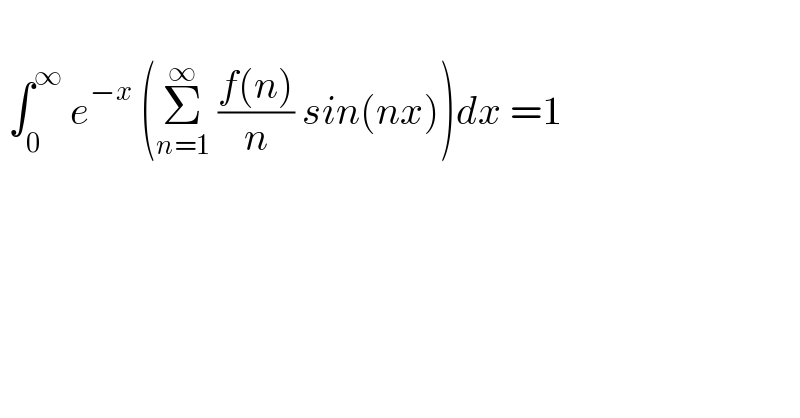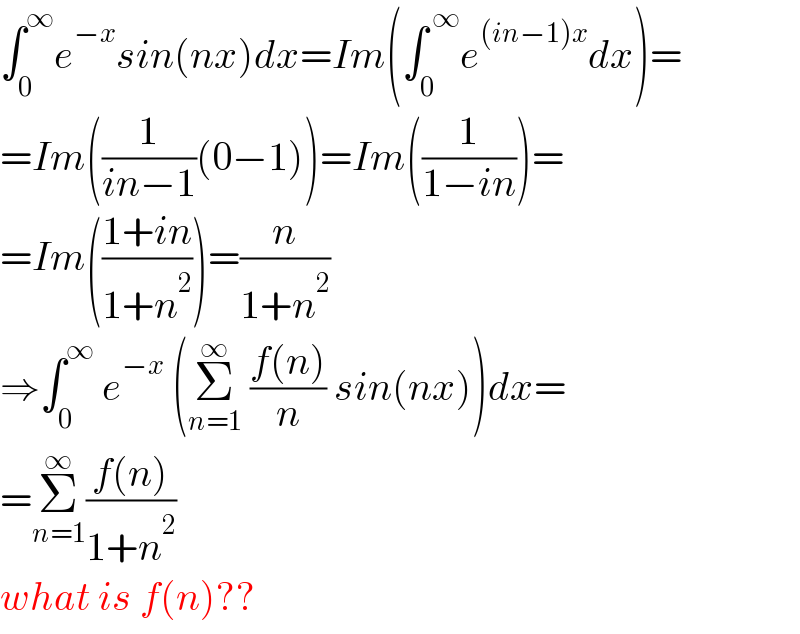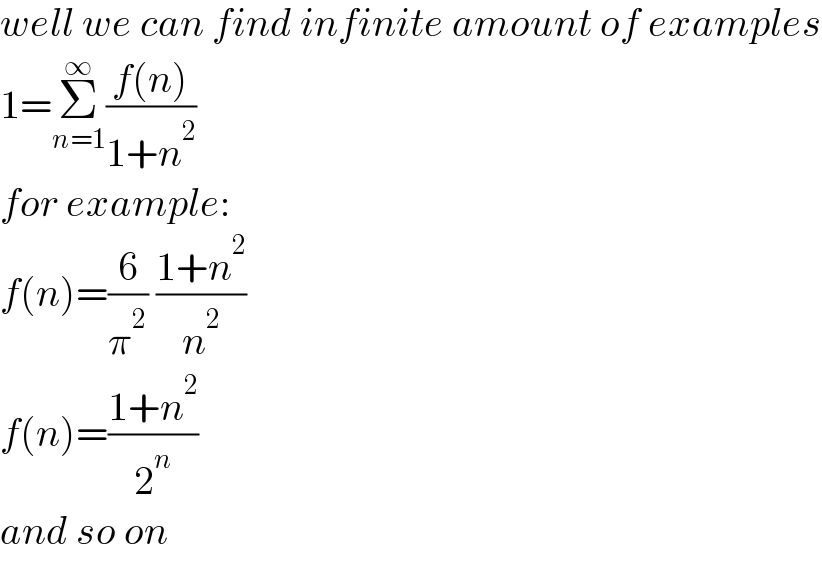
Question Number 218583 by Nicholas666 last updated on 12/Apr/25

$$ \\ $$$$\:\int_{\mathrm{0}\:} ^{\infty} \:{e}^{−{x}} \:\left(\underset{{n}=\mathrm{1}} {\overset{\infty} {\sum}}\:\frac{{f}\left({n}\right)}{{n}}\:{sin}\left({nx}\right)\right){dx}\:=\mathrm{1} \\ $$$$ \\ $$
Answered by aleks041103 last updated on 12/Apr/25

$$\int_{\mathrm{0}} ^{\infty} {e}^{−{x}} {sin}\left({nx}\right){dx}={Im}\left(\int_{\mathrm{0}} ^{\:\infty} {e}^{\left({in}−\mathrm{1}\right){x}} {dx}\right)= \\ $$$$={Im}\left(\frac{\mathrm{1}}{{in}−\mathrm{1}}\left(\mathrm{0}−\mathrm{1}\right)\right)={Im}\left(\frac{\mathrm{1}}{\mathrm{1}−{in}}\right)= \\ $$$$={Im}\left(\frac{\mathrm{1}+{in}}{\mathrm{1}+{n}^{\mathrm{2}} }\right)=\frac{{n}}{\mathrm{1}+{n}^{\mathrm{2}} } \\ $$$$\Rightarrow\int_{\mathrm{0}\:} ^{\infty} \:{e}^{−{x}} \:\left(\underset{{n}=\mathrm{1}} {\overset{\infty} {\sum}}\:\frac{{f}\left({n}\right)}{{n}}\:{sin}\left({nx}\right)\right){dx}= \\ $$$$=\underset{{n}=\mathrm{1}} {\overset{\infty} {\sum}}\frac{{f}\left({n}\right)}{\mathrm{1}+{n}^{\mathrm{2}} } \\ $$$${what}\:{is}\:{f}\left({n}\right)?? \\ $$
Commented by aleks041103 last updated on 12/Apr/25

$${well}\:{we}\:{can}\:{find}\:{infinite}\:{amount}\:{of}\:{examples} \\ $$$$\mathrm{1}=\underset{{n}=\mathrm{1}} {\overset{\infty} {\sum}}\frac{{f}\left({n}\right)}{\mathrm{1}+{n}^{\mathrm{2}} } \\ $$$${for}\:{example}: \\ $$$${f}\left({n}\right)=\frac{\mathrm{6}}{\pi^{\mathrm{2}} }\:\frac{\mathrm{1}+{n}^{\mathrm{2}} }{{n}^{\mathrm{2}} } \\ $$$${f}\left({n}\right)=\frac{\mathrm{1}+{n}^{\mathrm{2}} }{\mathrm{2}^{{n}} } \\ $$$${and}\:{so}\:{on} \\ $$
Commented by Nicholas666 last updated on 12/Apr/25

$$\mathrm{asking}\:\mathrm{to}\:\mathrm{find}\:\mathrm{a}\:\mathrm{function}\:{f}\left({n}\right)\:\mathrm{wich}, \\ $$$$\mathrm{when}\:\mathrm{expressed}\:\mathrm{in}\:\mathrm{a}\:\mathrm{series}\:\mathrm{and}\:\mathrm{then}\:\mathrm{integrated}\: \\ $$$$\mathrm{over}\:\mathrm{the}\:\mathrm{factor}\:{e}^{−{x}} ,\:\mathrm{yields}\:\mathrm{the}\:\mathrm{value}\:\mathrm{1} \\ $$
